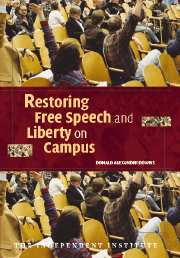Book contents
- Frontmatter
- Contents
- Acknowledgments
- Preface
- PART I INTRODUCTION AND BACKGROUND
- 1 The Return of the Proprietary University: The New Politics of Free Speech and Civil Liberty
- 2 The Rise of Ideologies against Free Speech and Liberty
- PART II CASE STUDIES IN THE POLITICS OF CIVIL LIBERTY ON CAMPUS
- PART III CONCLUSIONS
- Appendix
- Index
2 - The Rise of Ideologies against Free Speech and Liberty
Published online by Cambridge University Press: 12 July 2009
- Frontmatter
- Contents
- Acknowledgments
- Preface
- PART I INTRODUCTION AND BACKGROUND
- 1 The Return of the Proprietary University: The New Politics of Free Speech and Civil Liberty
- 2 The Rise of Ideologies against Free Speech and Liberty
- PART II CASE STUDIES IN THE POLITICS OF CIVIL LIBERTY ON CAMPUS
- PART III CONCLUSIONS
- Appendix
- Index
Summary
In this chapter, I provide some background material on the political and ideological culture of universities that gave rise to speech codes and related policies. I make no claim to tracing cause and effect in any definitive sense. My objective is simply to discuss some of the most salient intellectual, legal, and political movements that helped to marginalize such cardinal liberal principles as free speech, academic freedom, due process, and equal status under the law. Nor do I suggest that the ascendance of nonliberal principles and practices has been a monolithic movement, for many institutions have found themselves torn between their commitment to liberal principles and the illiberal aspects of the new agendas.
For example, while (Stanford adopted a new undergraduate requirement that moved away from traditional notions of liberal education, many departments have avoided the influence of such norms. The political science department at Stanford, for instance, remains a bastion of high-level methodology that is not affected by many of the trends discussed in this chapter. And while the University of California at San Diego has been afflicted by several free speech crises concerning conservative student publications, the political science department there has remained staunchly empirical and free of ideological bias. But the example of UC San Diego also indicates how the politics of the new campus agendas can affect key domains of even those institutions in which major departments remain committed to more traditional notions of academic freedom.
- Type
- Chapter
- Information
- Restoring Free Speech and Liberty on Campus , pp. 27 - 64Publisher: Cambridge University PressPrint publication year: 2004



